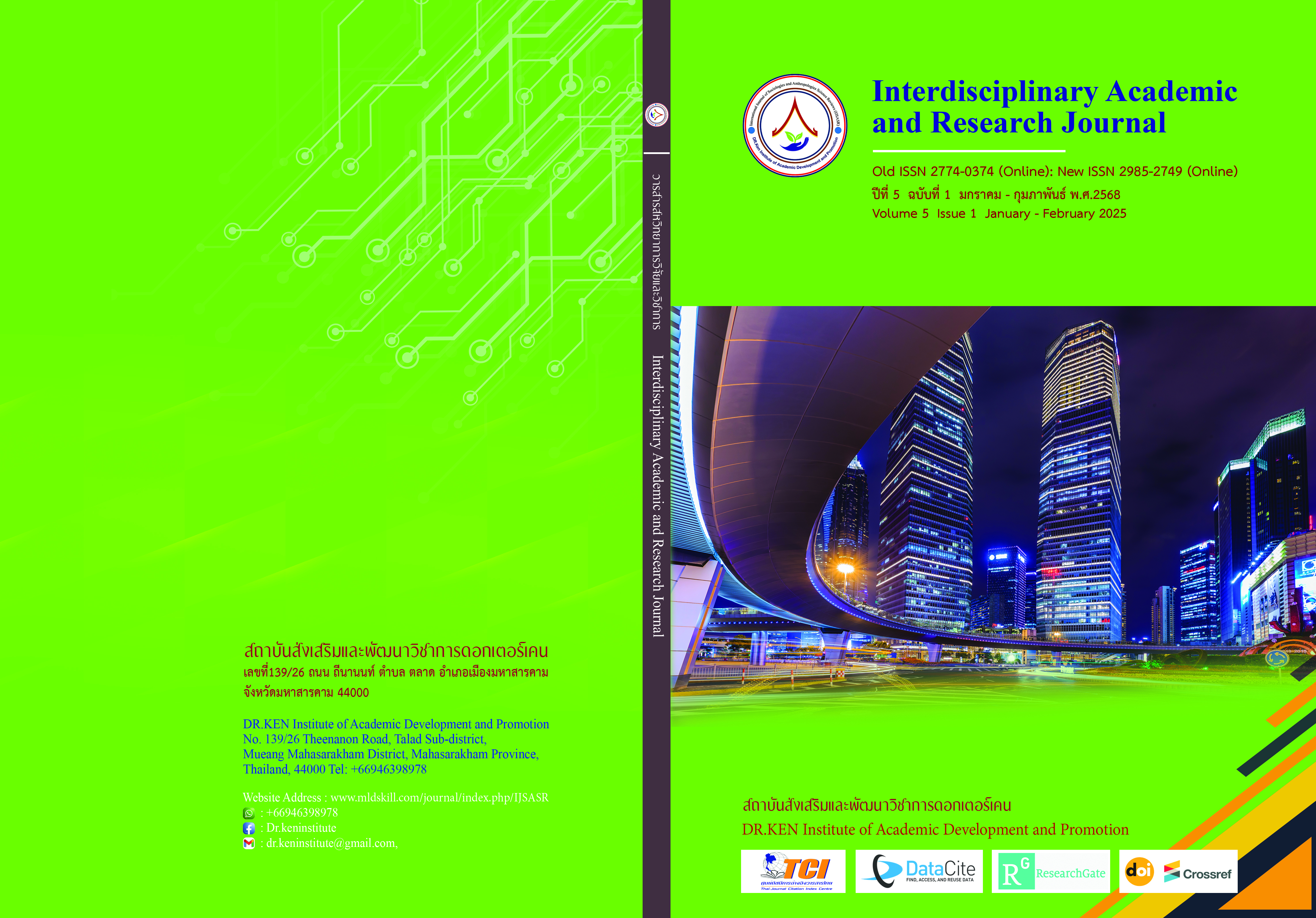Developing Law and Participation and the Role of Local Administration to Restore and Preserve Community Forest
DOI:
https://doi.org/10.60027/iarj.2025.280742Keywords:
Participation, Community forest, Local communityAbstract
Background and Aims: The research on the development guidelines for laws and forms of local community participation and the roles of local administrative organizations for community forest restoration and conservation has the following objectives: 1) To study the problems, obstacles, and limitations of the development guidelines for laws and forms of local community participation and the roles of local administrative organizations for community forest restoration and conservation. 2) To study the principles, concepts, and government policies related to the development guidelines for laws and forms of local community participation and the roles of local administrative organizations for community forest restoration and conservation. 3) To study international environmental agreements, community forest laws abroad, community forest laws in Thailand, and laws related to the powers and duties of local administrative organizations. 4) To study and analyze problems and determine guidelines for developing laws and forms of local community participation and the roles of local administrative organizations for community forest restoration and conservation. 5) To develop guidelines for developing laws and forms of local community participation and the roles of local administrative organizations for community forest restoration and conservation.
Methodology: This study is a qualitative research that integrates 3 disciplines: law, public administration, and management by studying data from primary and secondary documents, including principles, concepts, related theories, policies, national environmental strategies, environmental master plans, international environmental agreements, foreign laws and Thai laws, including data collection from field research, including in-depth interviews with 20 people and focus group discussions with 35 people. Doe used a specific selection method from stakeholders analyzed the data and described it descriptively.
Results: The results of the study found that 1) Community Forest management in Thailand still has legal problems, namely the lack of a mechanism based on the principle of true local community participation and the lack of a clear and effective role of local administrative organizations for the rehabilitation and maintenance of community forests. 2) This research study emphasizes and the principle of decentralization by determining the role of local governments, which are administrative organizations that are close to community forests, to play an important role in the conservation, restoration, management and utilization of natural resources, the environment and biodiversity in a balanced and sustainable manner. 3) From the study of community forest management in foreign countries, namely the United States, the Federal Republic of Brazil and the Kingdom of Bhutan, all 3 countries emphasize the participation of local communities, including the use of local culture as an important mechanism in community forest management. 4) Data from all research methods were analyzed to determine guidelines for the development of laws and forms of community participation for the rehabilitation and maintenance of community forests by comparing laws and policies in community forest rehabilitation in foreign countries, along with the analysis of principles and concepts to find appropriate guidelines for the conservation of community forests and creative utilization without destroying the natural resources of community forests. 5) Guidelines for law development by proposing the recognition of local community rights in the Constitution of the Kingdom of Thailand B.E. 2560 and proposing amendments to the Community Forest Act B.E. 2562, namely the recognition of local community rights and the amendment of the definition of community forests. The objectives of community forest management and the roles and responsibilities of local administrative organizations were revised to be consistent with the principles of decentralization and effective community forest management. In addition, a model for community forest management was proposed to be used as an integrated model alongside law enforcement, including: (1) Determining the roles and responsibilities of communities; (2) Determining the roles and responsibilities of local administrative organizations; (3) The roles and responsibilities of relevant government units; (4) Using local cultural mechanisms; (5) Using mechanisms for participating in carbon credit projects; (6) Utilization of community forests; (7) Promoting local wisdom from community forest products; and (8) Promoting ecotourism.
Conclusion: This research has set guidelines for the development of amendments to relevant laws, namely the Constitution of the Kingdom of Thailand, B.E. 2560 and the Community Forest Act, B.E. 2562. In addition, it is proposed to apply the 8 community forest management models to manage Thai community forests. The next research topic suggestion is the model for developing a mechanism system to promote community forest ecotourism.
References
กรมส่งเสริมคุณภาพสิ่งแวดล้อม. (2566). สิ่งแวดล้อมในชุมชน. Retrieved on August 5, 2023 from: https:// web.ku.ac.th/schoolnet/snet6/envi5/chum/chum.htm
จุมพต สายสุนทร. (2546). กฎหมายสิ่งแวดล้อมระหว่างประเทศ. กรุงเทพฯ : โครงการตําราและวารสารคณะนิติศาสตร์ มหาวิทยาลัยธรรมศาสตร์.
จุฬาพัฒน์ กีรติภูมิธรรม. (2561). กรอบกฎหมายว่าด้วยการคุ้มครองสิทธิของธรรมชาติหรือสิทธิของแม่ธรณี. วิทยานิพนธ์นิติศาสตรดุษฎีบัณฑิต, มหาวิทยาลัยศรีประทุม.
ราชกิจจานุเบกษา. (2542). พระราชบัญญัติกำหนดแผนและขั้นตอนการกระจายอำนาจให้องค์กรปกครองส่วนท้องถิ่น พ.ศ. 2542. ราชกิจจานุเบกษา, เล่มที่ 116 ตอนที่ 114 ก, (17 พฤศจิกายน 2542). หน้า 53.
ราชกิจจานุเบกษา. (2560). รัฐธรรมนูญแห่งราชอาณาจักรไทย พ.ศ. 2560. ราชกิจจานุเบกษา. เล่มที่ 134 ตอนที่ 40 ก. (6 เมษายน 2560). หน้า 20
ราชกิจจานุเบกษา. (2562). พระราชบัญญัติป่าชุมชน พ.ศ.2562. ราชกิจจานุเบกษา, เล่มที่ 136 ตอนที่ 71 ก. (24 พ.ค. 2562). หน้า 71
สมหญิง สุนทรวงษ์และคณะ. (2566). ป่าชุมชนกับสังคมไทย. Retrieved July 10, 2023 from: https: www. recoftc.org/Thailand/stories
สำนักงานคณะกรรมการพัฒนาการเศรษฐกิจและสังคมแห่งชาติ, (2562). ยุทธศาสตร์ชาติ พ.ศ. 2561-2580. พิมพ์ครั้งที่ 2. กรุงเทพฯ : สำนักงานคณะกรรมการพัฒนาการเศรษฐกิจและสังคมแห่งชาติ.
สุนีย์ มัลลิกะมาลย์. (2545). รัฐธรรมนูญกับการมีส่วนร่วมของประชาชนในการพิทักษ์รักษาทรัพยากรธรรมชาติและสิ่งแวดล้อม. กรุงเทพฯ: สำนักพิมพ์แห่งจุฬาลงกรณ์มหาวิทยาลัย.
World Commission on Environment and Development. (2023). International Civil Aviation Organization. Retrieved 12 August 2023 from, https://www.icao. int/ENVIRONMENTALPROTEC TION/Pages/CAEP.aspx.
Downloads
Published
How to Cite
Issue
Section
License
Copyright (c) 2025 Interdisciplinary Academic and Research Journal

This work is licensed under a Creative Commons Attribution-NonCommercial-NoDerivatives 4.0 International License.
Copyright on any article in the Interdisciplinary Academic and Research Journal is retained by the author(s) under the under the Creative Commons Attribution-NonCommercial-NoDerivatives 4.0 International License. Permission to use text, content, images, etc. of publication. Any user to read, download, copy, distribute, print, search, or link to the full texts of articles, crawl them for indexing, pass them as data to software, or use them for any other lawful purpose. But do not use it for commercial use or with the intent to benefit any business.
















.png)


